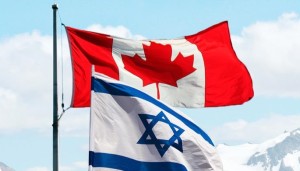Canada and Israel have signed a “modernized” free trade agreement that purports to provide better access to each country’s market and includes provisions for gender equality and environmental protection.
The update to the 21-year-old free-trade agreement was unveiled by International Trade Minister François-Philippe Champagne and Israeli Minister of Economy and Industry Eli Cohen, at a press conference held on May 28 at the headquarters of Stingray, a digital music company with strong ties to Israel, in Montreal.
The formal signing of the agreement took place during a festive evening at Federation CJA’s Gelber Conference Centre, before hundreds of Jewish community guests.
Deborah Lyons, Canada’s ambassador to Israel, and Nimrod Barkan, Israel’s ambassador to Canada, were on hand to promote what Champagne described as “a new progressive partnership” that will facilitate exchange between the two increasingly knowledge-based economies.
Champagne said the changes include further eliminations or reductions of tariffs on agricultural and fisheries products, which will benefit Canadian exporters, and more efficient dispute-settlement mechanisms. There are also new provisions on gender, small- and medium-sized businesses and corporate social responsibility, as well as a recognition of the growth of e-commerce.
Since the Canada-Israel Free Trade Agreement came into force in 1997, trade in goods between the two countries has more than tripled, reaching a value of over $1.7 billion in 2017. The original deal applied only to goods and eliminated tariffs on all industrial and some agricultural and fisheries products.
READ: MINISTER SIGNS NEW TRADE AGREEMENT WITH ISRAEL
Champagne and Cohen said it is possible that trade could double again in the next five years, thanks to this revised agreement.
Other new provisions are aimed at reducing red tape for businesses, increasing transparency in regulatory matters and establishing mechanisms for resolving disputes over non-tariff barriers.
The government says the amendments will offer Canadian exporters a “more level playing field” with U.S. and European Union competitors.
The “progressive” elements incorporated into the agreement include an acknowledgement that constraints on women’s participation in international trade exist and that the environment must be protected. It also includes provisions on labour rights, greater benefits for small- and medium-sized enterprises and requires large corporations to adhere to social responsibility standards set by the Organization for Economic Co-operation and Development.
Champagne said Canada and Israel are “writing international law” by stipulating that gender equality be taken into account during dispute resolutions.
The fanfare over the updated document appears to be more about underlining the longstanding friendship between Canada and Israel, which both ministers proclaimed effusively.

The decision to hold the formal signing “in the heart of the Jewish community” was deliberate, said Liberal MP Anthony Housefather, who MCed the event. Stephen Bronfman, who represented Federation CJA, and Rabbi Reuben Poupko of the Centre for Israel and Jewish Affairs, both emphasized that the enhanced free-trade agreement is a reaffirmation of the two countries’ strong bilateral relationship.
“We want to share our know-how with the world, especially with allies like Canada,” said Cohen, who noted that many Israeli products are now used by Canadians on a daily basis. “With Canada, Israel will continue to change the world for the best of humanity.”
Asked about Canada’s demand for an independent inquiry into the shooting of a Canadian doctor in Gaza during the recent border protests, Cohen said that Israel is concerned with the welfare of the Palestinian people, but Hamas, a terrorist organization, has spent over $4 billion in the past four years, “not on hospitals or schools, but on building rocket factories and tunnels in order to strike Israel.”
Champagne said that there is no contradiction in “deploring the violence and asking for an independent and mutual investigation to get to the bottom of the facts,” and building ties with Israel, a partner that Canada can have “a frank and open discussion” with.
Champagne said he will accept Cohen’s invitation to visit Israel, probably later this year.
According to information from Global Affair Canada, the agreement could come into force as early as next year:
“Once implementing legislation has received royal assent and other measures necessary for Canada to implement the agreement are in place, the government will be able to seek the required authority, through orders in council, for the ratification and entry into force of the agreement and the entry into force of the implementing legislation.”
The updated agreement was praised by Jewish groups.
“The signing of the modernized Canada-Israel FTA is yet another exciting landmark achievement for the already strong Canada-Israel relationship,” said David Cape, national chair of the Centre for Israel and Jewish affairs, in a statement. “Because of this updated agreement, both Canadians and Israelis will enjoy countless new opportunities in the innovation, science and technology sectors, all based on the modern knowledge-based economy.
“This agreement is the culmination of work started by the previous government and continued by the current government, demonstrating once again how the Canada-Israel friendship transcends politics and is valued and supported by all parties over many years.”









